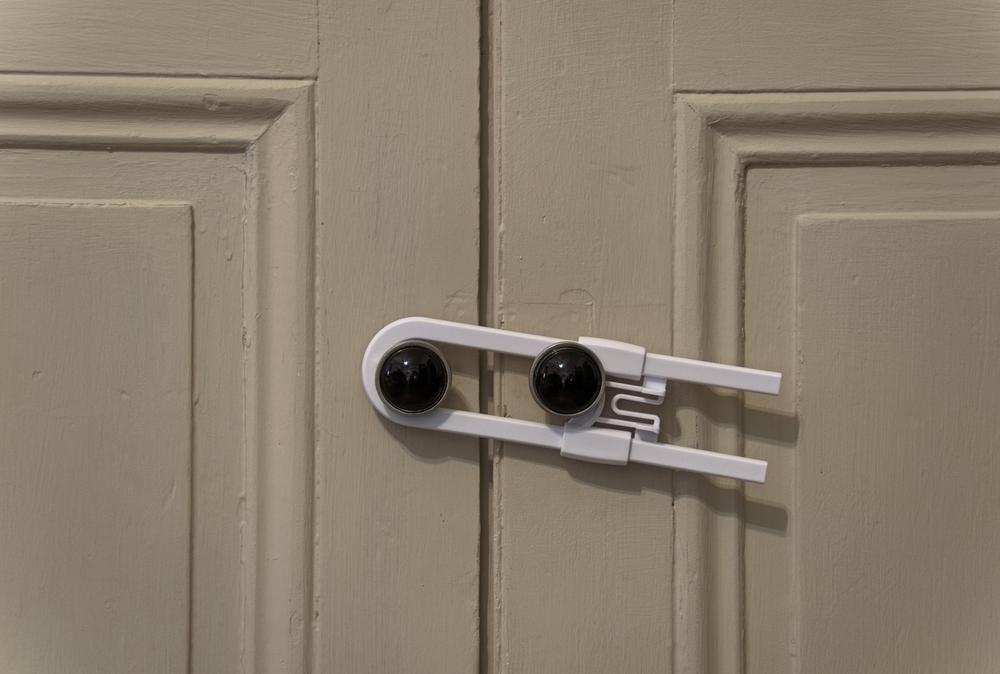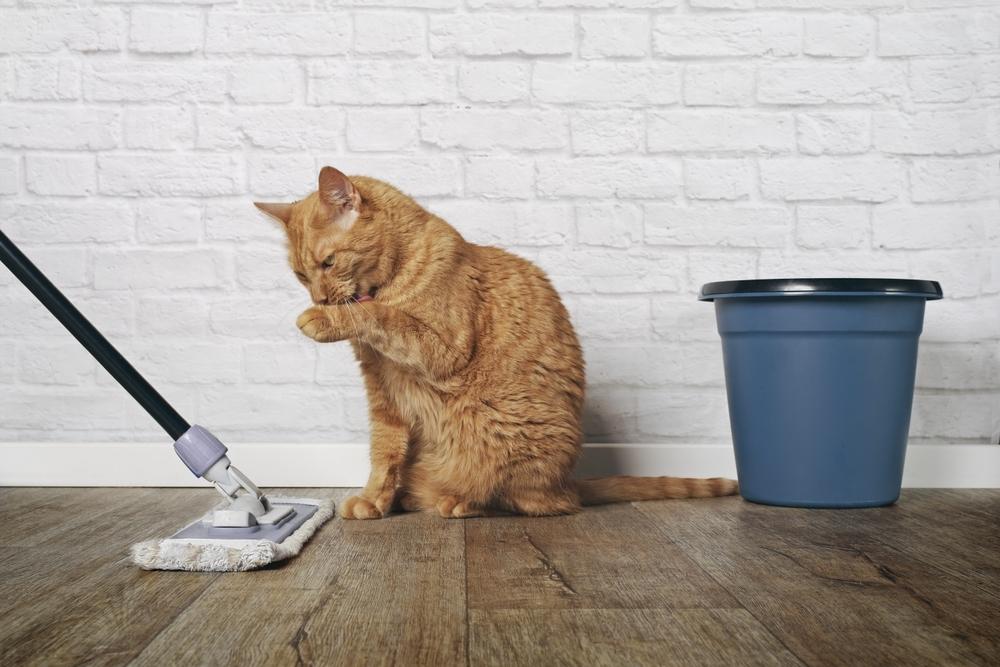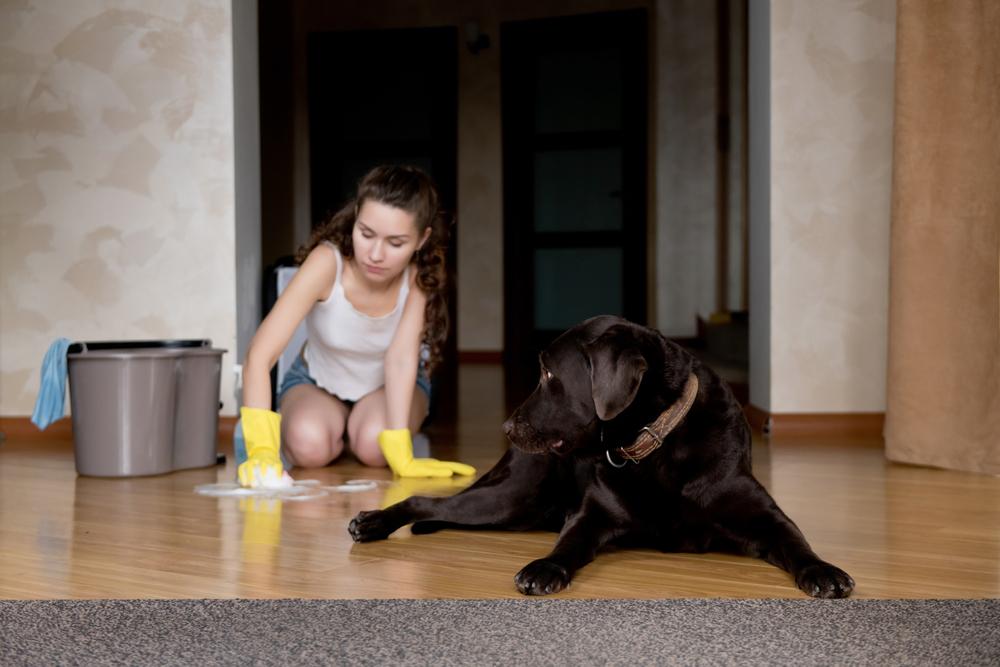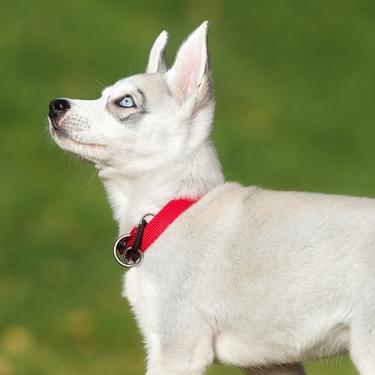

Keeping a clean household is at the top of many chore lists, but are you using a pet-safe disinfectant? How do you know if a disinfectant is safe for cats? What disinfectant is safe for dogs? Knowing how to help keep dogs and cats safe around common household cleaners is must-have information for pet parents. Read on to learn about potentially harmful ingredients and how to keep them out of your furry friend's reach for a clean, pet-safe environment.
Pet Safety Tips for Using Household Cleaners
Dogs are famous for chewing everything from shoes to floors to clothing. Some cats chew, too. Furthermore, both cats' and dogs' self-grooming routines include licking their paw pads, making it critical to understand how to properly use cleaning products when sharing your home with pets. Here are some tips for keeping your pets safe around cleaners and disinfectants.
Carefully Follow Instructions for Use
Start by examining product labels for warnings and directions for use. Always follow the manufacturer's instructions exactly as printed, and keep all products in their original containers.
For example, Centers for Disease Control and Prevention (CDC) explains many disinfectants are toxic when wet but safe once dry. So, if a product label instructs you to keep pets away from treated areas until completely dry, heed this warning. Of course, never apply any household cleaner — even formulas labeled "pet-safe" — directly on your pet.

Securely Store Cleaning Products
As when kitten- or puppy-proofing your home, adopt a pet's-eye view of the world when bringing cleaners into your space. Think about where your pet walks, sniffs, sleeps and plays. Assume no surface is out of reach — especially if you have a cat! Store your cleaning products in locked cabinets, and ensure all lids are securely shut.
Be Prepared To Get Your Pet Help
Ingesting, coming into contact with or inhaling toxic cleaning agents can have serious consequences for pets. If you suspect your dog or cat ingested a cleaning product, contact your veterinarian or Animal Poison Control immediately at (888) 426-4435. Many product labels also contain emergency contact information. Wherever you call for help, keep the product within reach so you can quickly provide details as requested.
Common Cleaner Ingredients
When it comes to potentially harmful ingredients, risks to your pet's health typically result from contact or ingestion, so the key to keeping your pet out of harm's way is proper use and storage. With that understanding, here's some information about specific cleaner ingredients.
Phenol
This organic chemical compound is used in some disinfecting wipes, sprays and floor cleaners. Some, but not all, cleaning products that have "sol" in their name contain phenol. Phenol is highly toxic to cats. If you have cats at home, CDC recommends avoiding cleaners with this ingredient entirely.
Alkyl Dimethyl Benzyl Ammonium Chloride (BAC)
This chemical is the top active ingredient in most brand-name and store-brand disinfecting wipes and sprays, likely due to its effectiveness and high margin of safety when used properly. However, if ingested even in small quantities, this ingredient can cause elevated body temperature, hypersalivation and tongue ulcers in pets. In general, cats are at higher risk of this level of ingestion than dogs due to their grooming habits. Ingestion in large quantities can result in bloody diarrhea, seizures, collapse and coma.
Didecyldimethylammonium Chloride (DDAC)
Common in household disinfectants and patio cleaners, this surfactant can be toxic to pets if ingested or inhaled, presenting similar risks as BAC. In addition to using products containing this ingredient exactly as directed — including keeping pets away from the area during use — properly ventilate the area after use, such as by opening a window.
Ammonia
This industrial chemical is found in many multisurface cleaners and household cleaning products for floors, windows, ovens, toilets, drains, bathrooms and stainless steel surfaces. Ingestion or direct contact or inhalation is highly toxic to pets. Furthermore, CDC explains you should never mix ammonia with bleach. This combination can produce a toxic gas dangerous to pets and humans alike.
When using ammonia-based products — especially sprays — place your pet in a separate room and keep them busy with toys or another welcome distraction until you're finished cleaning.
Isopropyl Alcohol
Commonly known as rubbing alcohol, isopropyl alcohol is the active ingredient in hand sanitizer. Ingestion may cause vomiting and other signs associated with alcohol toxicity.

Bleach
Household chlorine bleach is a common cleaner on its own or as an added ingredient. Because some cats are oddly drawn to its scent, bleach is far from a cat-friendly disinfectant. While it also fails to qualify as a safe disinfectant for dogs, take extra care to avoid it if you live with cats, as they may try to lap it up or lick treated surfaces.
Non-Chlorine or "Color-Safe" Bleach
Less toxic than regular bleach, non-chlorine bleach usually contains hydrogen peroxide, which can cause vomiting if ingested.
Essential Oils
In general, avoid undiluted essential oils in a home with pets, especially if you have cats. Most essential oils are toxic when ingested or inhaled. They can also absorb through the skin, so never apply any essential oil directly to your pet.
A Word on 'Natural' Products
What about cleaners touting "natural" ingredients on their product labels? Natural doesn't mean pet-safe. The term is generally considered a marketing tactic, as it can mislead consumers to think a product is safer than it is. Since it's not regulated, "natural" doesn't have a clear, singular meaning. Focus on label warnings and instructions for safe use instead, especially when cleaning and disinfecting pet supplies.
Pet-Safe Disinfectant Alternatives
Here are some options that can keep your floors and surfaces clean and give you peace of mind about your pets' safety. As always, make sure your pet doesn't ingest these cleaners. Even nontoxic substances can cause unwanted effects if ingested.
Accelerated Hydrogen Peroxide®
This nontoxic, pet-safe disinfectant contains surfactants, compounds that help liquids spread more easily. It's more stable than traditional hydrogen peroxide, making it a nonirritating and safe disinfectant for cats and dogs when used as instructed.
Dish Soap
This tried-and-true cleaner is effective without putting pets in harm's way. Despite its safety as a household cleaner, avoid using dish soap in place of pet shampoo. It can dry and irritate your pet's skin.
Vinegar
Vinegar kills many viruses and bacteria, so you can use it for cooking and cleaning! Dilute it with water or use it directly, depending on the surface, for an easy, safe disinfectant for cats and dogs. Pour it in a spray bottle and label it as a pet-safe disinfectant spray.

Potential Side Effects of Hazardous Cleaning Products
Depending on the substance, your pet's size and the type of contact, exposure to hazardous cleaning agents can include the following side effects:
Upset stomach
Diarrhea
Vomiting
Seizures
Respiratory infection
Chemical burns
Liver failure
Kidney failure
Subtle signs that indicate skin exposure can be easy to miss, such as scratching, redness or sores. In severe cases, ingesting toxic substances can be fatal to pets.
Protecting Your Pet's Safety
Disinfecting your home is a necessary part of life, especially when you share your home with pets. Luckily, you can help keep your home sparkling and your pets safe by using household cleaners as directed.
When in doubt about a cleaner, consult your vet with any questions. Secure cleaning products out of your curious pet's reach at all times, and keep your pets out of the area while you're cleaning and until all surfaces are thoroughly dry. If you think your pet ingested any cleaner or chemical, contact your veterinarian or Animal Poison Control right away. They're here to help you protect your pet's health and safety.
Accelerated Hydrogen Peroxide® and Design are trademarks of Diversey, Inc.



















